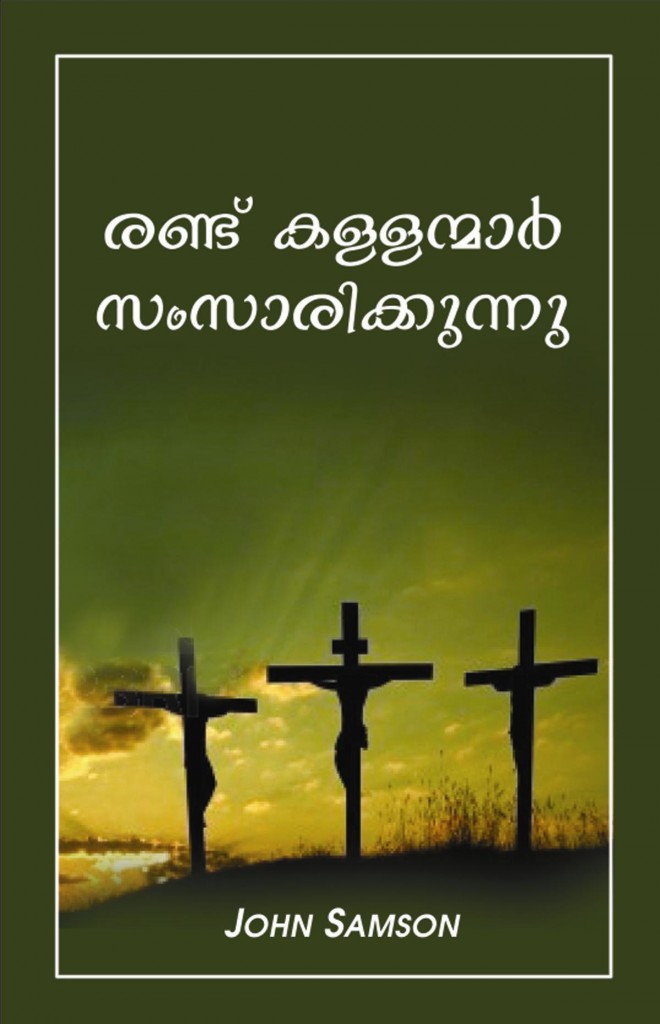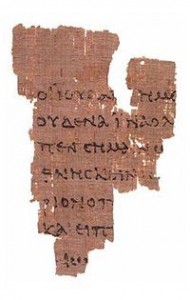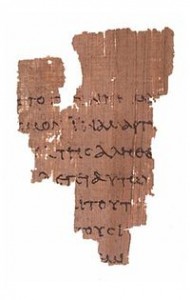12 it was said to her, “THE OLDER WILL SERVE THE YOUNGER.”
13 Just as it is written, “JACOB I LOVED, BUT ESAU I HATED.”
To quote Dr. John Piper in his comments on these verses, “After saying in verse 11 that God determines the destiny of Jacob and Esau before they were born or had done anything good or bad, he supports this with a quote from the Old Testament. “Just as it is written, “Jacob I loved, but Esau I hated.” [Malachi 1:2-3]
What did Paul see in this quote from Malachi that made it right for him to use it in this way to support the unconditional election of Jacob over Esau? Let’s go read it in context. What we will see is that Malachi’s way of arguing is exactly like Paul’s. Malachi 1 declares:
1 “The oracle of the word of the Lord to Israel through Malachi.
2 “I have loved you,” says the Lord. But you say, “How have You loved us?”
[Then God answers]
“Was not Esau Jacob’s brother?” declares the Lord. “Yet I have loved Jacob;
3 but I have hated Esau, and I have made his mountains a desolation and appointed his inheritance for the jackals of the wilderness.”
Do you see how God is arguing for his love for Jacob?
They say, “How have you loved us?” And He answers, “Wasn’t Esau Jacob’s brother?”
In other words, “Didn’t Esau have as much right to be chosen as you? Wasn’t he the son of Isaac? Wasn’t he a twin in the same womb with you? Wasn’t he even your elder brother? Nevertheless, I chose you.” The whole point of that question, “Wasn’t Esau Jacob’s brother?” is exactly the same point Paul is making here.
Paul saw it in Genesis. And he saw it in Malachi. Jacob and Esau had an equal claim on God’s choosing, namely, no claim. And God chose Jacob unconditionally. That is the meaning of “Jacob I loved.” In fact, we will never understand or experience the fullness of God’s love until we grasp what it means to be chosen freely by God on the basis of nothing in us.”
What should amaze us is not that God hated Esau, for he was a sinner by nature like the rest of us, fully deserving God’s wrath and justice. What should shock us to the core is the fact that God for no reason in Jacob, set His love on Jacob.
Jacob was not in any way more deserving of God’s love than Esau. So why was Jacob loved and Esau not… at least not in the same way or to the same extent? Verse 11 has already told us the answer to that, “so that God’s purpose according to His choice would stand, not because of works but because of Him who calls.”
What about God’s hatred of Esau? How are we to understand this “hatred?”
Again, let me quote Dr. Piper, “I think we should put aside all speculations here and get the meaning strictly from the context in Malachi and Romans 9. Let’s read Malachi 1:3-4,
3 “But I have hated Esau, and I have made his mountains a desolation and appointed his inheritance for the jackals of the wilderness.”
4 Though Edom [i.e., Esau] says, ‘We have been beaten down, but we will return and build up the ruins;’ thus says the Lord of hosts, ‘They may build, but I will tear down; and men will call them the wicked territory, and the people toward whom the Lord is indignant forever.'”
Verse 4 points to two ways of understanding God’s hatred.
The first meaning is seen in the word “wicked.” Near the end of verse 4 God says,
“Men will call them the wicked territory.” “I have hated Esau . . . I will tear down; and men will call them the wicked territory.” In other words, God gives them up to wickedness. This is important in view of what we said earlier about the conditionality of God’s final judgment. God does not bring judgments on an innocent Esau or Edom.
Edom was judged as wicked. When God passed over Esau and chose Jacob before they were born, there was no decree that an innocent Esau would be judged. Rather what God decreed was to pass Esau by, to withhold His electing love, and to give him up to wickedness. And as Esau acted in wickedness, he was accountable for that wickedness and deserved the indignation and judgment of God.
Which leads to the second meaning of God’s hatred. At the end of verse 4:
4 “And men will call them the wicked territory, and the people toward whom the Lord is indignant [or angry] forever.'”
In a sense you might say there is a passive and an active side of God’s hate. Passively, He withholds electing love from Esau and gives it only to Jacob, and hands Esau over to wickedness – a wickedness for which he is really accountable and blameworthy. Then actively, God is angry with this wickedness forever. And if Esau is finally condemned, he will not be able to say “I do not deserve condemnation.” His own sins will shut his mouth, and his own conscience will condemn him. And Jacob on the other side will tremble with fear and wonder that he was chosen to believe and be saved.”
As we continue in the text of Romans 9 we see that Paul then anticipates the response of an imaginary objector: namely, that God’s choice to have mercy on some but not on all, but for the rest to receive His justice, is unfair or unjust.
Paul raises this as an anticipated response from someone taking exception to what Paul was writing. In all probability, this was not the first time he had taught on this theme, and therefore, he would know all too well the objections that would usually be raised to his teaching. He says, in so many words, “I know exactly what you’re going to say in response to this. You’re going to say that this election idea is just not fair, for God is obligated to show the same kind of mercy to everyone or else He is not being fair. Right?”
Many today believe this exact same objection to be true, but it is important to point out that those who believe Divine Election to be unfair, believe something the Apostle Paul raised as a possible objection to his own teaching. There is absolutely no doubt that the Apostle Paul would not be counted amongst those who thought it unfair of God to choose some but not all for salvation. In fact, he couldn’t have been more clear as to where he stood on this issue.
It should at least make us stop in our tracks. How can we accuse God of being unfair in this doctrine of election, when the Apostle Paul, under the inspiration of the Holy Spirit, said that there is absolutely no injustice on God’s part to show mercy to whom He will? If God is the author of Scripture, which I believe He is, then it is God Himself, through Paul, who is flatly denying any alleged injustice on His part!
Mercy can never be demanded. If mercy can be demanded, then we’re no longer talking about mercy. Mercy is always given at the discretion of the one showing mercy; for if this is not the case, we would be talking about justice and not mercy. For example, if a Governor pardons one criminal on death row, it doesn’t mean he has to pardon every criminal on death row. Showing mercy to someone is not unjust, nor unfair, and neither is showing justice to others. It is never unjust to be just. There is no crime committed when a Judge dispenses justice; and likewise when a Judge shows mercy.
Let’s continue with Paul’s argument.
14 What shall we say then? There is no injustice with God, is there? May it never be!
Regarding this issue of election, of God choosing one and not another, the Apostle denies in very clear and emphatic language that there is unrighteousness or unfairness in God. There is no injustice in God, and lets remember, there was no righteousness in us, which would require God to be gracious to us. As Paul writes elsewhere, predestination and election occurs “according to the kind intention of His will, to the praise of the glory of His grace.” (Eph. 1:5, 6) Mercy is always given at the discretion of the one showing mercy. God reserves the right to dispense His mercy as He sees fit, to the person or persons He chooses.
continued in part 3 here


 P52 (Papyrus number 52), is the earliest manuscript fragment we have of the New Testament.
P52 (Papyrus number 52), is the earliest manuscript fragment we have of the New Testament. And on the other side of the fragment, from John 18: 37,38 it reads:
And on the other side of the fragment, from John 18: 37,38 it reads: Here are some things I came across that I wanted to share.
Here are some things I came across that I wanted to share. In Romans chapter 9, Romans 9 follows on from Romans 8, and in the latter part of Romans 8, Paul is stating the fact that nothing and no one can separate the true believer from the love of Christ. But this raises a huge question; namely, why is it that not all Jews, the chosen people, have recognized their Messiah, the Lord Jesus Christ? How can nothing separate God’s people from the love of Christ and many of the Jews be separated from it? That’s exactly the question Paul is seeking to answer in Romans 9.
In Romans chapter 9, Romans 9 follows on from Romans 8, and in the latter part of Romans 8, Paul is stating the fact that nothing and no one can separate the true believer from the love of Christ. But this raises a huge question; namely, why is it that not all Jews, the chosen people, have recognized their Messiah, the Lord Jesus Christ? How can nothing separate God’s people from the love of Christ and many of the Jews be separated from it? That’s exactly the question Paul is seeking to answer in Romans 9.